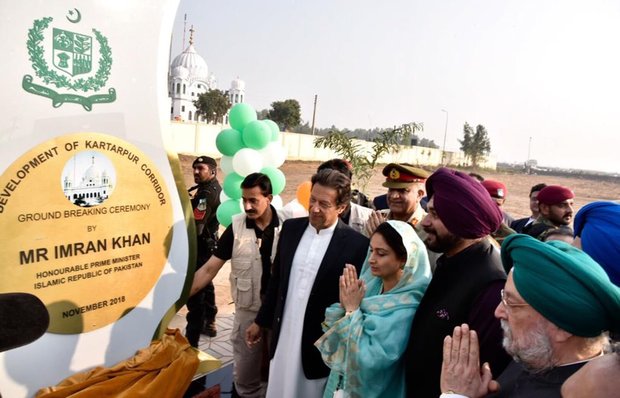Prime Minister Imran Khan once again extended an olive branch to New Delhi. But the Narendra Modi led right-wing government in India did not respond too warmly. In cricketing parlance, captain Khan bowled a vicious yorker that clean bowled Modi's diplomacy.
On Wednesday, the much-anticipated groundbreaking ceremony of Kartarpur corridor linking Gurdwara Darbar Sahib in Pakistan's Kartarpur, the final resting place of Sikhism founder Guru Nanak, to Dera Baba Nanak shrine in India's Gurdaspur district, was done by PM Khan in the presence of political dignitaries from both the countries.
Pakistan has decided to open the corridor for Sikh pilgrims, allowing them to visit the holy site without a visa. When the corridor, which includes a road and a bridge, becomes operational next year, around the 550th birth anniversary of Guru Nanak, Sikhs will have visa-free access to the site first time since the partition of erstwhile British India in 1947.
Although Indian government endorsed the project and sent two junior ministers for the groundbreaking ceremony, the overall response has been halfhearted, much to the chagrin of peaceniks on both sides. Since it is election season in India, Narendra Modi led government is understandably treading cautiously to keep its loyal Hindu vote bank in good humor.
The relations between the two countries have always been marked by acrimony and mistrust. During the previous government in Islamabad, the ties between them had touched a new low, with a series of ceasefire violations on the border and a few terrorist attacks in India. India accuses Pakistan of proxy war, a charge Islamabad has denied vehemently.
After the new government took over in Islamabad, the two sides made subtle peace overtures, which unfortunately fizzled out sooner than expected. India canceled the Foreign Minister level talks on the sidelines of the UNGA Summit in New York, accusing Pakistan of killing policemen in the disputed Kashmir territory.
It followed words of words between Imran Khan and Narendra Modi, in which Khan had a clear edge.
But the damage done was not irreversible, as PM Khan proved it. His government decided to open the Kartarpur corridor, and went a step further by inviting India's Foreign Minister Sushma Swaraj and Punjab Chief Minister Amarinder Singh, besides other Indian politicians for the groundbreaking ceremony. It was unarguably a diplomatic masterstroke and New Delhi was caught unawares.
Both Swaraj and Singh turned down the invite. But, the cricketer-turned-politician Navjot Singh Siddhu, who is credited for making the project possible owing to his friendship with PM Khan, accepted the invite and became a cynosure of all eyes in Pakistan. Despite being slammed at home for shaking hands with the enemy, Siddhu won the battle of hearts across the divide.
This is a corridor of infinite possibilities, of peace, of prosperity, of opening up of trade relations, Sidhu told media persons in Lahore. I feel that this corridor will be a bridge and erase enmity. It will increase people to people contact and bring peace.
Pakistan played its cards well. Going a step further, Islamabad unofficially sent an invite to PM Modi for the upcoming SAARC Summit. India turned down the invite, with Swaraj saying that bilateral dialogue cannot take place till the time Pakistan puts a curb on terrorist activities emanating from its soil, adding that the Kartarpur initiative by Pakistan cannot be a sole path to resumption of dialogue.
While India remains adamant on not shaking hands with Pakistan, Imran Khan has sent a clear and categorical message that Islamabad is interested in initiating a dialogue to resolve outstanding issues. There have been mistakes on both sides in the past, but we will not be able to move forward until we break the chains of the past,” he said at the Kartarpur ceremony.
Even the Pakistani army chief, who is seen as a de-facto ruler in Pakistan, termed it a step towards peace that the region needs. Barbed wire at borders is measure by a sovereign state to check/deny illegal crossings. Corridors and Gates are for legal peaceful visitors. So is the case for all our neighbors, General Bajwa said.
Chaudhry Fawad Hussain, Pakistan's Minister for Information, said Isalamabad through its conduct has once again showed who stands for peace in South Asia. Sherry Rehman, senior Pakistan Peoples? Party (PPP) leader, hoped the two countries can build similar bridges to help people-to-people contact, especially to ease travel and humanitarian causes.
With Kartarpur initiative, Pakistan has not only taken a massive lead over India in terms of diplomacy, but it has also warmed hearts that bat for peace in the two countries. Captain Khan, batting on the front foot, has played a beautiful, well-timed and calculated shot, piercing the gaps to bring up his hundred days in office.
MNA/TT

























Your Comment